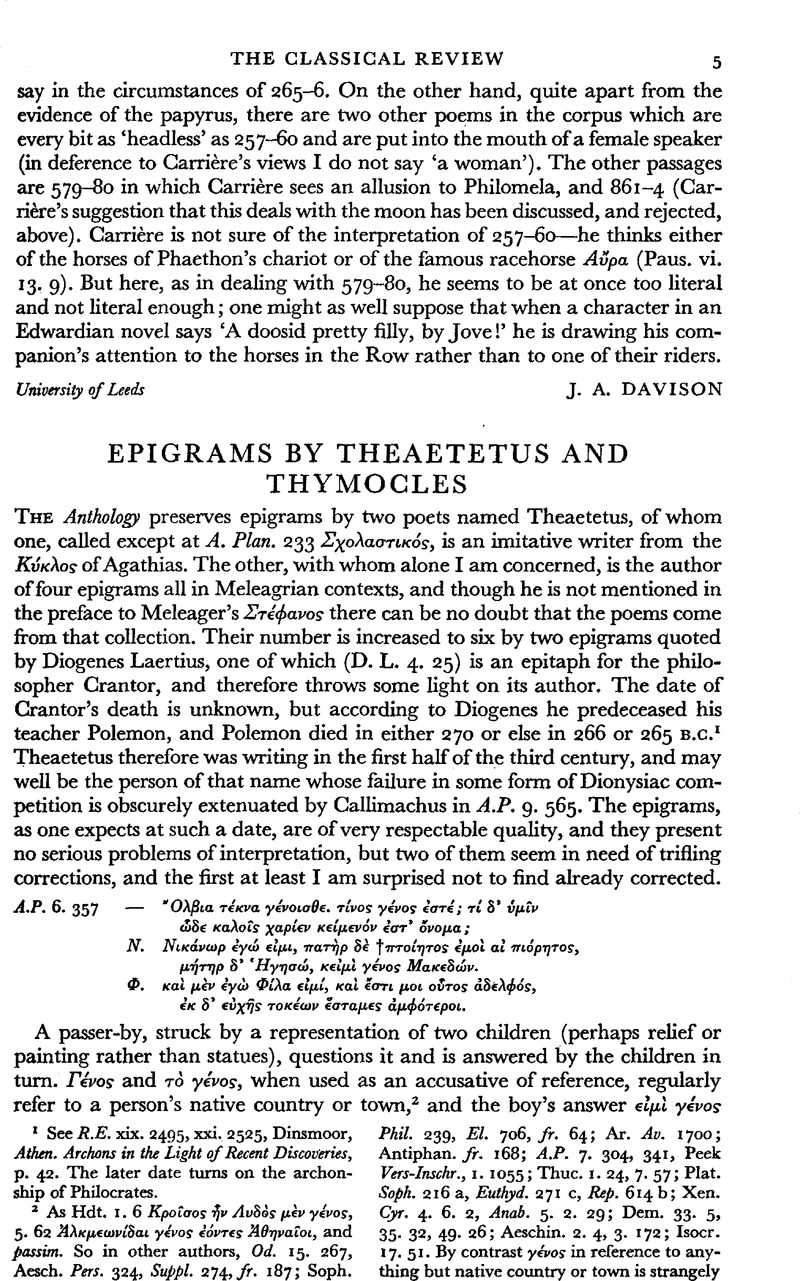No CrossRef data available.
Published online by Cambridge University Press: 13 February 2009

page 5 note 1 See R.E. xix. 2495, xxi. 2525, Dinsmoor, Athen. Archons in the Light of Recent Discoveries, p. 42. The later date turns on the archon-ship of Philocrates.
page 5 note 2 As Hdt. 1. 6 ![]() , 5. 62
, 5. 62 ![]() , and passim. So in other authors, Od. 15. 267, Aesch. Pers. 324, Suppl. 274, fr. 187; Soph. Phil. 239, El. 706, fr. 64; Ar. Av. 1700; Antiphan. fr. 168; A.P. 7. 304, 341, Peek Vers-Inschr., 1. 1055; Thuc. 1. 24, 7. 57; Plat. Soph. 216 a, Euthyd. 271 c, Rep. 614 b; Xen. Cyr. 4. 6. 2, Anab. 5. 2. 29; Dem. 33. 5, 35. 32, 49. 26; Aeschin. 2. 4, 3. 172; Isocr. 17. 51. By contrast ϒ⋯νoς in reference to any-thing but native country or town is strangely
, and passim. So in other authors, Od. 15. 267, Aesch. Pers. 324, Suppl. 274, fr. 187; Soph. Phil. 239, El. 706, fr. 64; Ar. Av. 1700; Antiphan. fr. 168; A.P. 7. 304, 341, Peek Vers-Inschr., 1. 1055; Thuc. 1. 24, 7. 57; Plat. Soph. 216 a, Euthyd. 271 c, Rep. 614 b; Xen. Cyr. 4. 6. 2, Anab. 5. 2. 29; Dem. 33. 5, 35. 32, 49. 26; Aeschin. 2. 4, 3. 172; Isocr. 17. 51. By contrast ϒ⋯νoς in reference to any-thing but native country or town is strangely
page 6 note 1 Pax 186, Av. 108; cf. Alex. fr. 90.
page 6 note 2 The father's name has reduced the scribe to confusion but in the lemma it is Eὐπτo⋯ητoς. The name is possible, for 'Aπτo⋯ητoς occurs in Ditt. Syll 3. 46. 146, and though odd in meaning is no odder than Eὔøoβoς (I.G. i suppl., 373 y) which matches ᾄøoβς. It looks rather more likely that the lemmatist took it from his exemplar than that he fabricated it from the text of P, and, if so, δ⋯μoι E⋯πτo⋯ητoς of an apograph may perhaps be correct.
page 6 note 3 The number is large but we may suppose that it includes slaves working in a farm or factory. See generally Büchsenadded schütz, Besitz u. Erwerb, p. 197.
page 6 note 4 As Pind. N. 4. 92 Ἔλπετα⋯ ![]() , Thuc. 6. 31. 4, 7. 75. cf. Ar. Vesp. 1431. So also combined with εις Soph. Ant. 262
, Thuc. 6. 31. 4, 7. 75. cf. Ar. Vesp. 1431. So also combined with εις Soph. Ant. 262 ![]() .
.
1 Am. J. Phil. ix. 318, J. Phil. xvi. 261, xx.40.